The kitchen is such a central room for any home. This is why kitchen plumbing problems can be so disruptive to your home life. When the plumbing starts to have problems, it can make tasks that were once very simple much more complicated, and in some cases, it might even make them impossible.
To prevent these problems, Toronto homeowners should do what they can to maintain the plumbing system in their kitchen. However, even with the best maintenance, components of the system can fail, and problems can occur. To help gain a better understanding of kitchen plumbing problems and their causes, we are going to take a look at some of the signs that can indicate a need for plumbing repairs in the kitchen.
Low Water Pressure
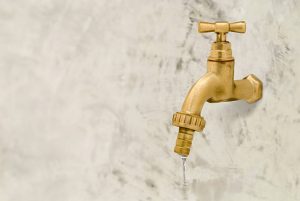 A drop in water pressure can be a real problem at any fixture. When the pressure at the kitchen sink is poor, it can make tasks like washing dishes more difficult and time-consuming. Low water pressure at the kitchen sink can come from a number of different problems. It could be mineral deposits at the tap, a problem with the water lines in your home or it could be a problem with the municipal water supply.
A drop in water pressure can be a real problem at any fixture. When the pressure at the kitchen sink is poor, it can make tasks like washing dishes more difficult and time-consuming. Low water pressure at the kitchen sink can come from a number of different problems. It could be mineral deposits at the tap, a problem with the water lines in your home or it could be a problem with the municipal water supply.
The most common problem is the build-up of mineral deposits on the faucet’s aerator. The water that is piped to your home has dissolved mineral content. When the water flows through the faucet, these minerals can collect on various parts. When they build up enough, this can cause problems with the flow from the tap. An easy way to clean the aerator on your sink is to simply unscrew it from the faucet and let it sit in vinegar overnight. This should dissolve the minerals and remove the obstruction.
If removing mineral deposits from the faucet components doesn’t work, then you may have a problem with the pressure at the water supply. If you have recently remodeled a room or added a water-using appliance to the home, the existing supply lines might not be enough to handle the additional water needs.
You can start to diagnose the problem by turning the water on at the sink, and then turning on more fixtures. If the pressure drops as you continue to turn on more fixtures, it is likely that there is a problem with the supply. In this case, you may need to upsize the supply line to increase the flow. If the pressure does not decrease with added fixtures, then there could be problems with the supply line that runs to the kitchen. In older galvanized pipes, it is not uncommon for minerals and sediment to build up in the pipes and obstruct flow.
Aside from cleaning the faucet, most of these issues will require the services of a professional plumber. If you have a line that is clogged or a line that needs to be upsized, a plumber will be able to identify the problem and provide you with the right fix. As a final issue, there could be a problem with the municipal water main. If that is the case, you will need to wait for the city to fix the problem. If you suspect that there is a problem with the municipal water supply, you should contact Toronto Water.
Dishwasher Problems
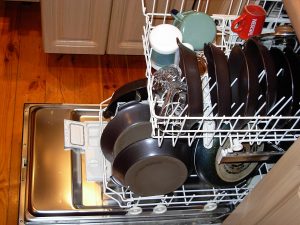 Having a dishwasher can be a great convenience. The newest models are very efficient, and they offer performance that is far better than the machines that came out a few decades ago. That said, when a dishwasher has problems, it can eliminate any convenience that you would expect from these appliances, and in some cases, it can even result in damage to your home.
Having a dishwasher can be a great convenience. The newest models are very efficient, and they offer performance that is far better than the machines that came out a few decades ago. That said, when a dishwasher has problems, it can eliminate any convenience that you would expect from these appliances, and in some cases, it can even result in damage to your home.
If your dishwasher is leaking, that could be due to any number of problems. Things like tears and cracks in the gasket around the door can cause the unit to leak. You may have problems with the supply line or the drainage line. It could also be a problem with the inlet valve. If you are experiencing any of these problems, it is best to avoid using the unit until you can get a plumber to come to check the machine out.
Drainage problems are another common issue with dishwashers. Drainage problems usually become apparent when you notice sitting water left in the dishwasher after the cycle ends. This could be the result of any number of problems. Clogs in the drainage line, a clogged filter, a clogged or malfunctioning pump. In some cases, a plumber might be able to repair or unclog the dishwasher, in others, it might mean that it is time for a replacement.
Noisy dishwashers are another problem that some homes might experience. All dishwashers generate a little noise, but you should notice when your dishwasher is making a noise that is out of place. Once again, this could be due to a number of reasons. In most cases, strange noises in the dishwasher come from parts that have either gone bad or have come loose. This is another case where a plumber might be able to fix it, but some parts will cost so much that it would be cheaper to buy a new dishwasher.
Leaky Faucet
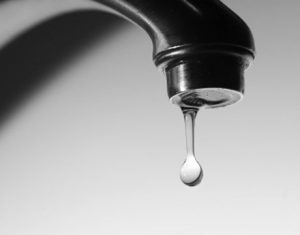 When a faucet leaks, it can wastewater and the sound of it can be quite irritating. In general, this is a problem that is only going to get worse with time, so it is best to try to repair the faucet as soon as you notice a leak.
When a faucet leaks, it can wastewater and the sound of it can be quite irritating. In general, this is a problem that is only going to get worse with time, so it is best to try to repair the faucet as soon as you notice a leak.
In most cases, a leaking kitchen faucet is the result of a faulty O-ring or washer. If you are relatively handy, this is a repair that you can perform on your own. If you don’t feel like taking your faucet apart and looking for all of the parts, you could solve the problem by replacing the faucet altogether.
While faulty parts tend to be the most common cause of leaking faucets, there could be some other issue. If replacing the washers and O-ring fails to resolve the problem, then you will need to call in a professional plumber.
Slow or Clogged Drains
When a sink is slow to drain or won’t drain at all, it can be a real problem. You have the dirty dishwater that is just sitting there, and you probably can’t use your sink until you find a solution. If your sink is slow to drain or won’t drain at all, it means that there is a blockage somewhere in the line. The question you have to ask is whether it is a clog that is just affecting the kitchen sink, or if it is a problem that exists for the entire home.
Before calling a plumber, there are some things that you can do to try to resolve the problem on your own. To start, grab your plunger and see if you can dislodge the blockage. If that doesn’t work, you could consider using a liquid drain cleaner. If you are feeling handy, you could try cleaning the P-trap on your kitchen sink.
If none of those solutions work, then it is time to call in a drain cleaning professional. It could be a stubborn clog that will require specialized equipment that you are unlikely to own. If it is a larger drainage problem for the entire home, then the plumber might need to inspect the lateral drain that connects your home to the municipal sewer.
Garbage Disposal Problems
Garbage disposal is another one of those appliances that can be a great convenience when it is working well, but when it has problems, it can be a real pain. Common problems with garbage disposals include issues where it simply won’t turn on, jammed blades and issues where the unit leaks.
If you find that it is a situation where the garbage disposal seems not to have any power, there are a few things you can check. To start, you want to look under the sink to see if it is plugged in. If the wiring goes directly to the unit, you should turn off the breaker and check the connections. If there is no problem with the connections, you could check the reset button on the bottom of the unit. If none of that works, then it could be a problem with the wiring at the switch.
In some cases, an object may have gotten caught in the impellers. This will jam the unit and render it inoperable. If you turn it in on and hear a hum but the machine is not working, that is a good sign that the disposal is jammed. If you want to try to fix this yourself, you need to be very careful. Turn the switch off and turn the power off at the breaker before trying to remove any obstruction. Instead of trying to put your hand down there, it is best to find a long thing tool that you can use to dislodge the object that is jamming the blades.
As a final point, the unit might start to leak or you could find that the motor has burnt out. In some cases, you can replace parts on the garbage disposal. More than likely, things like leaks and faulty parts mean that it is time to replace the unit.
Refrigerator Issues
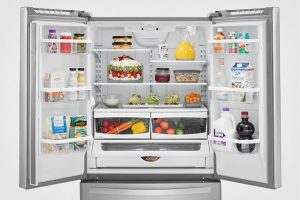 When it comes to plumbing problems for the refrigerator, we are talking about the supply line that connects to the icemaker or the water dispenser on the door. In some cases, you might find that the water supply has been interrupted, and in others, it could be a leak in the waterline.
When it comes to plumbing problems for the refrigerator, we are talking about the supply line that connects to the icemaker or the water dispenser on the door. In some cases, you might find that the water supply has been interrupted, and in others, it could be a leak in the waterline.
A leaking supply line to the refrigerator is a fairly simple fix. To start, you need to check the water line for any leaks. Inspect the entire line to see if there are any cracks, and go to the connection points to make sure the lines are secure. If it is a loose connection, you might be able to fix it by making sure the line is secure and tightening the nut at the connection. If the line is damaged, a repair might be possible, but there is also a chance that it will need to be replaced.
If you find that the water supply is not working, it could be a few different things. If we are talking about an icemaker, a common problem is a frozen line. For water dispensers, it could be something like a clogged filter. Other than that, you might have a faulty actuator or solenoid in the supply system.
A Lack of Hot Water
Having enough hot water at your kitchen sink can be important for washing dishes and other household chores. If you find that you have either no hot water or not enough hot water, there are a few things to consider.
The first thing you can check is the shutoff valve under the sink. Before you move on to more complicated repairs or call in a plumber, it is a good idea to check a simple fix like this. If it is turned off or partially closed, turn the valve counter-clockwise as far as it will go. You could also go to the hot water heater to make sure the valve on the water heater is open.
If you have added appliances or fixtures to the hot water supply, it could be that your hot water heater is just too small to keep up with the increased demands. In that case, you would need to consider upgrading to a larger hot water heater.
This is another issue where mineral deposits can cause problems. Before you call a plumber, you could take apart the faucet and clean out any mineral deposits that might be obstructing flow to the hot water valve.
If you have checked the supply to make sure the hot water valve is open and that it is clean and you still have problems, then it is time to call in a professional plumber. It could be that you are having problems with your hot water heater, or there might be an obstruction somewhere in the hot water supply lines. Either way, it is a good idea to get a professional on the job.
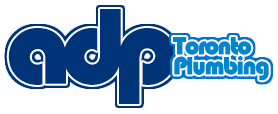
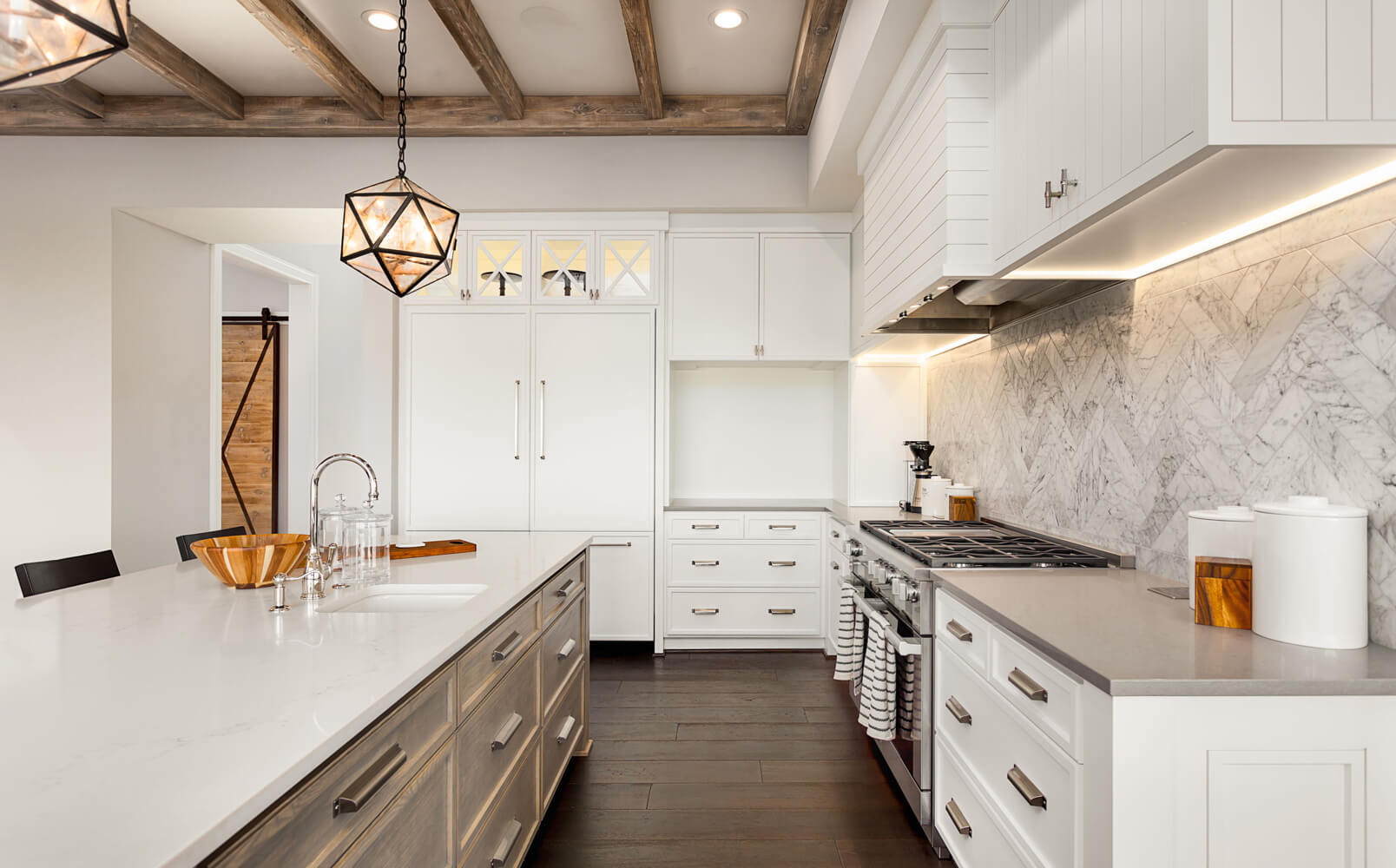
Thanks for this, so true. The kitchen really needs maintenance!
Thanks for this, so true. The kitchen really needs maintenance!
Thanks for this, so true. The kitchen really needs maintenance!